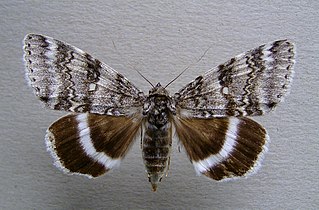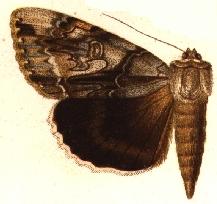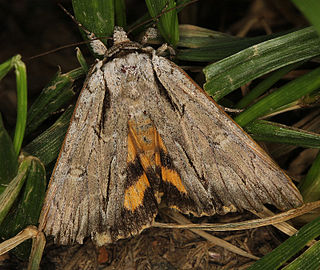
Catocala is a generally Holarctic genus of moths in the family Erebidae. The genus was erected by Franz von Paula Schrank in 1802. The moths are commonly known as underwing moths or simply underwings. These terms are sometimes used for a few related moths, but usually – especially when used in plural, not as part of a species name – they are used to refer to Catocala only.

Catocala fulminea, the yellow bands underwing, is a moth of the family Erebidae. The species was first described by Giovanni Antonio Scopoli in his 1763 Entomologia Carniolica. It is found in central and southern Europe, east Asia and Siberia. The xarippe lineage has been proposed to be a distinct and valid species in its own right, instead of being only subspecifically distinct.

Catocala promissa, the light crimson underwing, is a moth of the family Erebidae. The species was first described by Michael Denis and Ignaz Schiffermüller in 1775. It can be found in Europe and Anatolia up to Armenia.

Catocala adultera is a moth in the family Erebidae first described by Édouard Ménétries in 1856. It is found in northern Europe, from Siberia to the Russian Far East and Mongolia.

Tanaorhinus is a genus of moths in the family Geometridae. It was described by Butler in 1879.

Catocala junctura, the joined underwing or Stretch's underwing, is a moth in the family Erebidae. The species was first described by Francis Walker in 1858. It is found throughout temperate North America, ranging from New York and Pennsylvania west to Montana, Colorado, Oklahoma, Arizona, and into Texas, and north to southern Illinois, extreme southern Alberta and Saskatchewan; it has also been recorded west of the Rocky Mountains from California and south-eastern British Columbia. It is typically found near water, where the food plants of its caterpillar larvae grow plentifully.

Catocala relicta, the white underwing or relict, is a moth of the family Erebidae. The species was first described by Francis Walker in 1858. It lives in southern Canada, from Newfoundland to Vancouver Island, south to Missouri, and Arizona.

Catocala obscura, the obscure underwing, is a moth of the family Erebidae. The species was first described by Ferdinand Heinrich Hermann Strecker in 1873. In Canada it is found in southern Quebec and Ontario and in the United States it is found from Massachusetts and Connecticut south to North Carolina, west to Mississippi and north to Iowa, Illinois, Ohio, and Michigan.

Catocala vidua, the widow underwing, is a moth of the family Erebidae. The species was first described by James Edward Smith in 1797. It is found in North America from southern Ontario, into Maine, New Hampshire and Connecticut, south at least to Tennessee, Georgia and Alabama, west to Texas and Oklahoma, and north to Wisconsin.

Catocala innubens, the betrothed underwing, is a moth of the family Erebidae. The species was first described by Achille Guenée in 1852. It is found in North America from southern Ontario and Quebec south through Michigan, Connecticut, Tennessee to Florida and west to Texas and Oklahoma and north to Wisconsin.

Catocala mesopotamica is a moth of the family Erebidae first described by Nikolai Yakovlevich Kuznetsov in 1903. It is found in Turkey.

Catocala clintoni, Clinton's underwing, is a moth of the family Erebidae. It is found from Ontario and Quebec, southward to Florida, west to Texas and north to Wisconsin.

Catocala sordida, the sordid underwing, is a moth of the family Erebidae. The species was first described by Augustus Radcliffe Grote in 1877. It is found in North America from Saskatchewan east to New Brunswick and Prince Edward Island and south through Maine and Connecticut to Florida, west to Texas and north to Manitoba.

The Trictenotomidae are a small family of beetles in the superfamily Tenebrionoidea, containing fifteen species in two genera. Most species are found in the Oriental realm where they live in montane forest habitats. The family is considered, based on larval characters as well as sequence-based studies, to be closely related to the Salpingidae.

Macrauzata minor is a moth in the family Drepanidae first described by Okano in 1959. It is found in Taiwan.

Paraona staudingeri is a moth of the family Erebidae first described by Sergei Alphéraky in 1897. It is found in the Russian Far East, China, Korea, Japan and Taiwan.

Tanaorhinus formosanus is a species of moth of the family Geometridae first described by Okano in 1959. It is found in Taiwan.

Catocala lupina is a moth in the family Erebidae first described by Gottlieb August Wilhelm Herrich-Schäffer in 1851. It is found from south-eastern Europe to south-western Siberia, Asia Minor and Transcaucasia.














